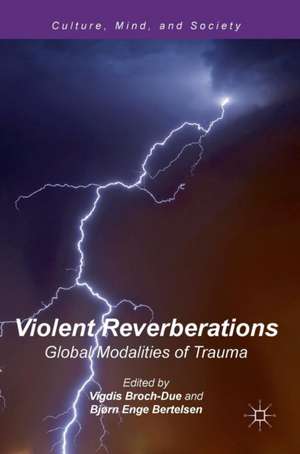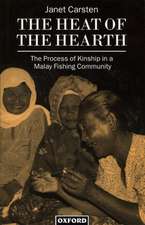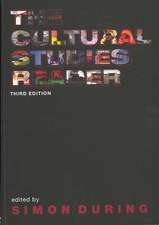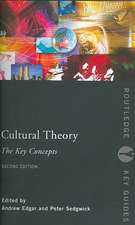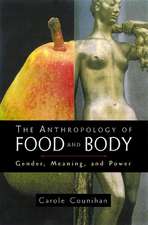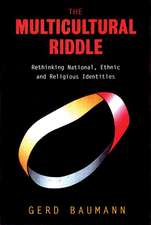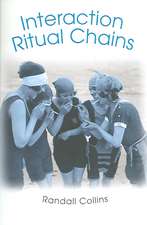Violent Reverberations: Global Modalities of Trauma: Culture, Mind, and Society
Editat de Vigdis Broch-Due, Bjørn Enge Bertelsenen Limba Engleză Hardback – 11 noi 2016
| Toate formatele și edițiile | Preț | Express |
|---|---|---|
| Paperback (1) | 694.69 lei 6-8 săpt. | |
| Springer International Publishing – 23 iun 2018 | 694.69 lei 6-8 săpt. | |
| Hardback (1) | 699.59 lei 6-8 săpt. | |
| Springer International Publishing – 11 noi 2016 | 699.59 lei 6-8 săpt. |
Din seria Culture, Mind, and Society
- 15%
 Preț: 695.01 lei
Preț: 695.01 lei - 15%
 Preț: 702.05 lei
Preț: 702.05 lei -
 Preț: 383.71 lei
Preț: 383.71 lei - 15%
 Preț: 706.63 lei
Preț: 706.63 lei -
 Preț: 381.98 lei
Preț: 381.98 lei - 15%
 Preț: 586.05 lei
Preț: 586.05 lei -
 Preț: 387.20 lei
Preț: 387.20 lei -
 Preț: 386.81 lei
Preț: 386.81 lei -
 Preț: 388.72 lei
Preț: 388.72 lei - 15%
 Preț: 495.68 lei
Preț: 495.68 lei - 18%
 Preț: 895.58 lei
Preț: 895.58 lei -
 Preț: 392.97 lei
Preț: 392.97 lei - 15%
 Preț: 635.31 lei
Preț: 635.31 lei - 18%
 Preț: 731.91 lei
Preț: 731.91 lei - 15%
 Preț: 639.25 lei
Preț: 639.25 lei -
 Preț: 386.00 lei
Preț: 386.00 lei -
 Preț: 391.61 lei
Preț: 391.61 lei -
 Preț: 382.75 lei
Preț: 382.75 lei - 15%
 Preț: 591.47 lei
Preț: 591.47 lei -
 Preț: 386.99 lei
Preț: 386.99 lei - 18%
 Preț: 948.61 lei
Preț: 948.61 lei - 18%
 Preț: 948.79 lei
Preț: 948.79 lei -
 Preț: 387.38 lei
Preț: 387.38 lei -
 Preț: 199.76 lei
Preț: 199.76 lei -
 Preț: 385.84 lei
Preț: 385.84 lei -
 Preț: 385.25 lei
Preț: 385.25 lei - 15%
 Preț: 582.95 lei
Preț: 582.95 lei -
 Preț: 389.31 lei
Preț: 389.31 lei -
 Preț: 390.46 lei
Preț: 390.46 lei
Preț: 699.59 lei
Preț vechi: 823.05 lei
-15% Nou
Puncte Express: 1049
Preț estimativ în valută:
133.86€ • 139.78$ • 110.54£
133.86€ • 139.78$ • 110.54£
Carte tipărită la comandă
Livrare economică 15-29 aprilie
Preluare comenzi: 021 569.72.76
Specificații
ISBN-13: 9783319390482
ISBN-10: 3319390481
Pagini: 293
Ilustrații: XV, 279 p.
Dimensiuni: 148 x 210 x 22 mm
Greutate: 0.49 kg
Ediția:1st ed. 2016
Editura: Springer International Publishing
Colecția Palgrave Macmillan
Seria Culture, Mind, and Society
Locul publicării:Cham, Switzerland
ISBN-10: 3319390481
Pagini: 293
Ilustrații: XV, 279 p.
Dimensiuni: 148 x 210 x 22 mm
Greutate: 0.49 kg
Ediția:1st ed. 2016
Editura: Springer International Publishing
Colecția Palgrave Macmillan
Seria Culture, Mind, and Society
Locul publicării:Cham, Switzerland
Cuprins
Chapter 1: Violent Reverberations: An Introduction to Our Trauma Scenarios.- Chapter 2: Trauma, Violence, Memory. Reflections on the bodily, the self and the social.- Chapter 3: Universalizing Trauma Descendant Legacies: A Comparative Study of Jewish-Israeli and Cambodian Genocide Descendant Legacies.- Chapter 4: Social Trauma, National Mourning, and Collective Guilt in Post-Authoritarian Argentina.- Chapter 5: Organising Norwegian psychiatry: security as a colonizing regime.- Chapter 6: Dis-assembling the social: The Politics of Affective Violence in Memorandum Greece.- Chapter 7: Re-Assessing the Silent Treatment: Emotional Expression, Preventive Health and the Care of Others and the Self.- Chapter 8: Multisemic speech genres as vehicles for re-inscribing meaning in post-conflict societies. A Mozambican case.- Chapter 9: Violence, Fear and Impunity in Post-War Guatemala.- Chapter 10: Laughter without borders: embodied memory and pan-humanism in a post-traumatic age.
Notă biografică
Vigdis Broch-Due is Professor of Social Anthropology at the University of Bergen and Scientific Director at Centre for Advanced Study (CAS), Oslo, Norway. Her research in East-Africa spans 3 decades on the ethnography of poverty, gender and embodiment, cosmology, relations between animals, people and nature, pastoralist development, colonialism, violence and trust formation.
Bjørn Enge Bertelsen is Associate Professor of Social Anthropology at the University of Bergen, Norway. He has researched issues such as state formation, violence, poverty and rural-urban connections in Mozambique since 1998 in addition to having had a long-standing interest in theory development within the discipline of anthropology.
Textul de pe ultima copertă
The contributions to this volume map the surprisingly multifarious circumstances in which trauma is invoked – as an analytical tool, a therapeutic term or as a discursive trope. By doing so, we critically engage the far too often individuating aspects of trauma, as well as the assumption of a universal somatic that is globally applicable to contexts of human suffering. The volume takes the reader on a journey across widely differing terrains: from Norwegian institutions for psychiatric patients to the post-war emergence of speech genres on violence in Mozambique, from Greek and Cameroonian ritual and carnivalesque treatments of historical trauma to national discourses of political assassinations in Argentina, the volume provides an empirically founded anti-dote against claiming a universal ‘empire of trauma’ (Didier Fassin) or seeing the trauma as successfully defined by the Diagnostic and Statistical Manual of Mental Disorders (DSM). Instead, the work critically evaluates and engageswhether the term’s dual plasticity and endurance captures, encompasses or challenges legacies and imprints of multiple forms of violence.
Caracteristici
Probes truly global contexts of violence, trauma and memory beyond simplifying tropes of 'cultural difference' Alerts readers to the generative and inventive nature of trauma beyond the postmodern/posthumanist deconstruction of the term Takes down the authority of normative modernist constructions
